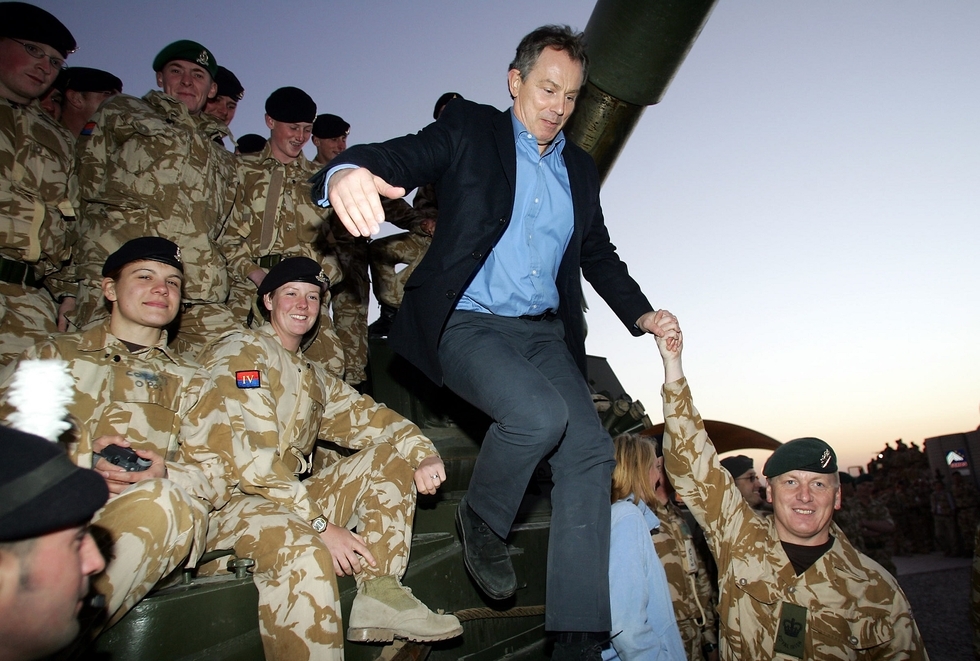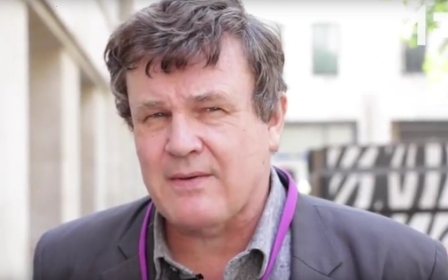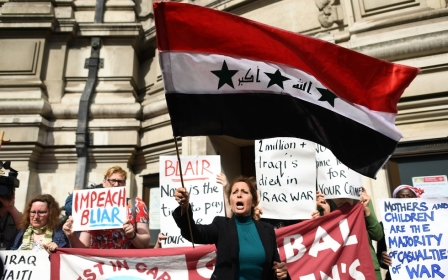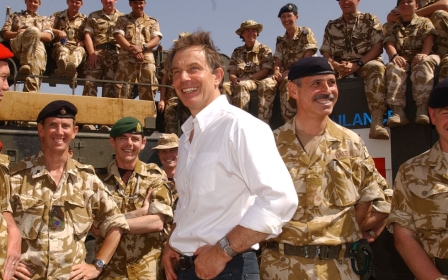Jumping the gun? Dissecting Blair's written statement on Chilcot

Tony Blair's statement on the Iraq Inquiry references specifc paragraphs in the wider Chilcot report to support his statement that it "lay to rest allegations of bad faith, lies or deceit".
This suggests that the former prime minister's team took the opportunity to pour through the entire report of 2.6 million words before its publication.
However, the references point to paragraphs which, if taken on their own, appear to offer almost no supporting evidence for Blair's statement.
The paragraphs highlighted by Blair's statement are full of jargon and require deep knowledge of the inquiry for them to make much sense to the casual reader. Blair's statement does not directly link to specific paragraphs, nor reproduce them.
Middle East Eye analyses Blair's prepared statement on the Chilcot report.
Responding to the publication of the Chilcot Report, Blair said:
“The report should lay to rest allegations of bad faith, lies or deceit. Whether people agree or disagree with my decision to take military action against Saddam Hussein; I took it in good faith and in what I believed to be the best interests of the country.
I note that the report finds clearly:
- That there was no falsification or improper use of Intelligence (para 876 vol 4)
MEE: Para 876 or volume 4 says this: "In April 2005, the ISG published additional material as Addendums to the Comprehensive Report."
A note from the ISG, the Iraq Survey Group, which was tasked by the UN to find Saddam Hussein's WMD, had found in "a very limited number of cases... old chemical munitions produced before 1990". But the note goes on to say that many reports of chemical weapons in Iraq turned out to be "scams" and while it was still possible that weapons could be found, it "would judge very unlikely, that such a capability remains undiscovered". In addition to navigating the the 2.6-million word Chilcot report, a casual observer would then be required to read the full 84-page report by the ISG to gain proper insight to Blair's argument that Chilcot had cleared him of falsifying evidence.
- No deception of Cabinet (para 953 vol 5)
Para 953 of volume 5 states: "The timing of the decision on 31 October to offer ground forces to the US on the same basis as Package 2 appears to have been driven primarily by the MOD advice of 29 October that the option of UK participation in ground operations through Turkey was at risk of being excluded from CENTCOM’s planning by default, and Adm Boyce’s advice in Mr Blair’s meeting on 31 October that US planning was proceeding on the basis that there would not be a UK land contribution."
You would have to find what "Package 2" was to understand its relevance. Almost 400 paragraphs back in volume 5, Package 2 is listed as an option given by Sir Michael Boyce, the Chief of the Defence Staff, to ministers including Blair and Geoff Hoon, the defence minister. It suggested that British troops already in the region could be bolstered with more air and ground support. How this absolves Blair specifically of charges he deceived or attempted to deceive the cabinet is unclear.
Indeed, the executive summary of Chilcot specifically states that Blair chose "Package 3", a much wider deployment, on 31 October 2002, and that the "decision and its potential consequences were not formally considered by a Cabinet Committee or reported to Cabinet".
- No secret commitment to war whether at Crawford Texas in April 2002 or elsewhere (para 572 onwards vol 1)
Para 572 states: "Much of the discussion took place privately between the two leaders. Sir David Manning recorded that the meeting on Saturday morning was informed:
"There was no war plan for Iraq; Thinking so far had been on a broad, conceptual level; A very small cell in Central Command in Florida had recently been set up to do some planning and to think through the various options; When the US had done that, US and UK planners would be able to sit down together to examine the options; The US and UK would work through the issues together."
This paragraph in isolation does indeed suggest that there was no secret commitment. However, the wider report states that Blair had said he was behind George W Bush "whatever" well before the decision was made to go to war.
- The inquiry does not make a finding on the legal basis for military action but finds that the Attorney General had concluded there was such a lawful basis by 13th March 2003 (para 933 vol 5)
Para 933 states: "Lord Goldsmith concluded on 13 March that, on balance, the 'better view' was that the conditions for the operation of the revival argument were met in this case, meaning that there was a lawful basis for the use of force without a further resolution beyond resolution 1441.
"You can read the full UN Security Council resolution 1441 here, but it essentially set out that Saddam Hussein must comply with weapons inspections or face 'serious consequences' - but did not spell out, specifically, the threat of military action."
While Chilcot does spell out what the attorney general told Blair, it does not pass judgment on the legality of that advice. This lack of power is the crux of the entire issue, which the Blair statement relies on to prove a point.
Blair's statement continued: "However the report does make real and material criticisms of preparation, planning, process and of the relationship with the United States.
"These are serious criticisms and they require serious answers.
"I will take full responsibility for any mistakes without exception or excuse.
"I will at the same time say why, nonetheless, I believe that it was better to remove Saddam Hussein and why I do not believe this is the cause of the terrorism we see today whether in the Middle East or elsewhere in the world.
"Above all I will pay tribute to our Armed Forces. I will express my profound regret at the loss of life and the grief it has caused the families, and I will set out the lessons I believe future leaders can learn from my experience.”
New MEE newsletter: Jerusalem Dispatch
Sign up to get the latest insights and analysis on Israel-Palestine, alongside Turkey Unpacked and other MEE newsletters
Middle East Eye delivers independent and unrivalled coverage and analysis of the Middle East, North Africa and beyond. To learn more about republishing this content and the associated fees, please fill out this form. More about MEE can be found here.




